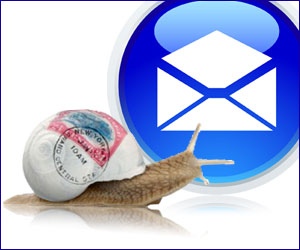 By the end of the day I feel like I’m covered in “lab”. So when my friends want to go out after work I really feel like I need to go home to regroup, but home is too far away- not practical. Is there anything I can do in the dingy bathroom at lab to refresh?
By the end of the day I feel like I’m covered in “lab”. So when my friends want to go out after work I really feel like I need to go home to regroup, but home is too far away- not practical. Is there anything I can do in the dingy bathroom at lab to refresh?
Walking the Thin Line Between a Great Result and a Lie
by
My PI often overstates my results when he presents my work in talks. How do I know if it’s just a little bit of hype versus being a lie, or even worse unethical?
– TJ, grad student
How to Contact Potential Postdoctoral Advisors: Email vs. Snail Mail
by
 To say email changed the way we communicate is like saying Saturday morning group meeting is a bad idea – it’s obvious. For most of us, email (including messaging through Facebook and related sites) is the reason we write with the penmanship of a second-grader. (For those born after 1990, “writing” means holding a pen in your hand and physically creating the letters and words on a piece of paper that would then be mailed to the recipient. “Mail” means…) Since it’s inception, people have debated the appropriateness of sending an email versus a physical letter for a range of life’s occasions. In our professional lives we fear choosing the wrong vehicle will put an end to our candidacy before our merits are even considered. Accordingly, one of the most common questions we receive from the lab is whether we should contact potential postdoctoral advisors by email or a traditional letter.
To say email changed the way we communicate is like saying Saturday morning group meeting is a bad idea – it’s obvious. For most of us, email (including messaging through Facebook and related sites) is the reason we write with the penmanship of a second-grader. (For those born after 1990, “writing” means holding a pen in your hand and physically creating the letters and words on a piece of paper that would then be mailed to the recipient. “Mail” means…) Since it’s inception, people have debated the appropriateness of sending an email versus a physical letter for a range of life’s occasions. In our professional lives we fear choosing the wrong vehicle will put an end to our candidacy before our merits are even considered. Accordingly, one of the most common questions we receive from the lab is whether we should contact potential postdoctoral advisors by email or a traditional letter.
Facebook Updates: The Good, The Bad, and the Vague
by
 One of my biggest pet peeves is “vague-booking”. You know, when people change their Facebook status to read “sigh” or “really?” or “I can’t believe that just happened :(“. Vague with a capital “V”. I know that the author of these atrocities just wants someone to ask them what happened, or express concern that they had a tough day, but my response is the exact opposite. To put it gently, I start to dislike the vague-booker.
One of my biggest pet peeves is “vague-booking”. You know, when people change their Facebook status to read “sigh” or “really?” or “I can’t believe that just happened :(“. Vague with a capital “V”. I know that the author of these atrocities just wants someone to ask them what happened, or express concern that they had a tough day, but my response is the exact opposite. To put it gently, I start to dislike the vague-booker.
How Long Should it Take to Get a Lab Off the Ground?
by
 Many events in life come with defined timetables. It takes 21 years to buy alcohol, four years to avenge an Olympic loss, and 11 seconds to lose your lunch if watching a Real Housewives episode. Yet in our scientific lives the time required to complete our most important milestones are undefined and arbitrary. Is five years just right for grad school, too much for postdocs and not enough for tenure decisions? Catalyzed by numerous conversations with fellow scientists, we’ve decided to examine each phase of our career development pathway to determine whether the phases are truly optimized for our success, or whether it’s time to overhaul the system.
Many events in life come with defined timetables. It takes 21 years to buy alcohol, four years to avenge an Olympic loss, and 11 seconds to lose your lunch if watching a Real Housewives episode. Yet in our scientific lives the time required to complete our most important milestones are undefined and arbitrary. Is five years just right for grad school, too much for postdocs and not enough for tenure decisions? Catalyzed by numerous conversations with fellow scientists, we’ve decided to examine each phase of our career development pathway to determine whether the phases are truly optimized for our success, or whether it’s time to overhaul the system.
Dear Boss: I Want to Graduate. Let’s Talk.
by
What’s the best way to get the conversation going about graduation dates with your PI?
– Henry, grad student
Keep Your Sanity With a Smile
by
Sometimes it feels like the Science Gods are looking down at us and laughing… not with us, at us. It’s time’s like these when it seems like the easiest thing to do is just join ’em. Here are a few articles that will hopefully lessen the pain…
BenchLife: Managing Your Life in the Lab
by
Getting Started in Lab
- The Path to Happiness in Research – there are no flying monkeys, but this yellow brick road will lead you straight to happiness
- Repetitive Strain Injury: The Hidden Lab Hazard – learn to recognize the early symptoms before ever picking up a pipette
- How to Choose a Good Scientific Problem – learning to identify the elements that make up a great project is vitally important
- The Keys to a Great Hypothesis – a poorly constructed hypothesis can waste time and ultimately kill a project
- The Importance of Side Projects – what’s that saying about all your eggs in one basket? Well it’s true in research too
- It Worked 3 Times…(Out of How Many?) – how many times do we need to perform an experiment before convincing ourselves the result is real?
- The Lab Panic Button – before even starting an experiment, go through these important steps to ensure everyone’s safety
- How to Keep a Lab Notebook – although they may seem like a pain, an improperly kept notebook could cost you millions
- H-index: What it is and How to Find Yours – this emerging author metric is a substitute for the widely used, and flawed, impact factor
- Wunderlist Task Management: Give Your Brain a Present – the only to-list manager you need (and it’s free!)
- What’s in a Name? – are you a biological chemist, biochemist, or chemical biologist? (Or does it even matter)
Be a Better Labmate
- A-Mean-Ol-Acid – an “amino acid” would be much preferred to the horrific scent coming out of your labmate’s mouth…here are a couple of solutions
- 5 Laboratory Techniques that’ll Get You Punched in the Face – avoid the most irritating and annoying lab habits if you want to keep your million dollar smile
- Make Labmates, Not Enemies – sure you may have been king or queen of the hill in your old job, but when joining a new lab, follow these tips to make the transition smooth for everyone
- Lab Etiquette: Don’t Make Us Call Supernanny – being a good labmate involves many of the basic principles we should have learned in kindergarten
- Could You Be the World’s Worst Labmate? – if you think there’s a chance, take this quiz to find out
Stay Focused and Motivated in Lab
- Laughter Really is the Best Medicine – the jury was out for a while and Xanax gave it a run for it’s money, but laughter came out on top
- The Arrogant Labmate: Face ’em or Forget ’em? – someone walking around lab with a bigger head than everyone else? Don’t hire Tanya Harding, resolve it yourself
- Bullying in the Lab: Are PIs Guilty? – the relationship between PI and student or postdoc can be volatile, but does it border on abuse?
- Words Your Boss Will Never Say – no need to get your hopes up, you’re not gonna hear it
- Five Ways Scientists Waste Time – when beginning a project, we should be sure we’ve checked off the items on this list or risk wasting a lot of time spinning our wheels
- Stay Motivated in Lab – sure it’s easy when starting or finishing a project – it’s just that whole middle period where things can get dicey
- Do You Recognize the 7 Early Signs of Lab Apathy? – sometimes apathy creeps up on us and before we know it we’ve lost interest in our project completely – here are some signs to watch out for.
Take Charge of Your BenchLife
- There’s Nothing Romantic About Watching the Sunrise…from Lab – unless your bench has 600 thread count sheets, you probably shouldn’t be sleeping on it
- The Tightrope: Finding Balance as a Scientist Mom – you’re crying for your experiments and your kids are crying for you – what to do next?
- Make Your PI Love You – being an employee is a game. If you play the game as your boss wants you to, you usually succeed. Here are some of the rules
- How to Behave Around the Boss – although the lab environment may at times seem more casual than a traditional office work place, our behavior around the boss should be carefully controlled
- What to Expect When You’re Expecting…in Lab – pregnancy is difficult enough without the sights, sounds and smell of a lab environment- how to navigate the lab and boss when you’re expecting
- Sleep Your Way to Better Science – no sleep frequently yields no results and now there’s science to prove why
- Organize Your Life: Getting Things Done – scattered thoughts? short attention span? feel overwhelmed? This simple system will help you gain control of your life and give your brain a much-needed rest
- Leaving Grad School Early: Get Outta Town or Hang Around? – when the going gets tough, is leaving the best option?
- Are You Prepared for the ‘Worst Case Scenario’? – sure best case scenarios are more fun to think about, but when stuff hits the fan in lab, it’s best to be prepared
Mastering Mindless Tasks
- Training Your Autopilot – even if your mind wanders during a repetitive assay, your body will always know what to do
- Assay Pipetting – prevent the horrible ‘Oh no! Did I already add substrate to that tube?!’ feeling with this simple system
- When in Doubt, Throw it Out – how can just a few words save days, weeks and even months of time? Take a few minutes to learn them
- Send Email Without the Worry – clicking ‘send’ prematurely can be one of the scariest moments in email. Never send an accidental email again with these tips and resources
.Lab Resources
- 5 Library Resources You Should be Using Now – a science librarian walks us through the resources we’d be foolish to overlook
- Five (Plus) Web Resources You Should Be Using Now – great (and free!) research tools that can manage citations, file sharing and much more
- Back of the Envelope Calculations – a list of some of the most common scientific numbers we should probably all have memorized
- The Art of Organizing Your Literature – technology affords us a number of upgrades on the old-school stack of papers – take advantage of them
- Three Steps to Mastering Literature Searches – you can’t organize literature if you can’t find it
Model Organism Primers
- Drosophila melanogaster: The Fruit Fly – this organism has been buzzing around the lab for over 100 years
- C. elegans: Getting to Know Your Worms – 19 reasons worms are a great model organism and a great introduction to their life cycle and biology
- Research’s Next Top Model: Zebrafish – this increasingly popular organism simplifies drug testing and has even been to space
- Neurospora crassa: The Almighty Fungi – this organism served as the foundation of biochemical genetics and played a central role in a Nobel prize
- Saccharomyces cerevisiae: Yeast Rising in Research – it’s not just for beer and bread anymore – see why yeast make a great model organism
- We’re Gonna Need a Bigger Lab: Large Animal Models in Research – sometimes bigger is better so see what larger animals are most commonly used in lab and why
- Eek! The Mouse – maybe one of the most famous model organisms used in research, mice have played a role in research in almost every disease imaginable
- Tetrahymena: Little Creatures, Big Discoveries – a mindbogglingly complex unicellular organism- it’s even got a mouth and a posterior.
Recipes: Chemistry You Can Eat
by
As scientists, we often have little time (and money) to prepare meals after a long day at the bench. However, many of us love cooking, which should be little surprise given that research is basically cooking with ingredients you can’t eat. Here are some of our favorite recipes that require little time, money or expertise to pull off!
Science Career Development Resources
by
.
Graduate School
- The Graduate School Survival Guide – although everyone’s experience is different, there are plenty of common milestones to expect along the way
- What Makes a Great Grad Student – three tenured professors discuss what they’re looking for in a truly outstanding graduate student
- How to Become a Great Grad Student – follow these steps to stand out from the crowd and be one of your PIs most memorable graduate students
- Working for Assistant Professors? Call Me After Tenure – the terms “risk” and “reward” are often brought up in this discussion, but is working with an assistant professor a good idea for your career?
- I’ve Found a Job- Final Steps of Graduate School – getting a job seems like the end, but wait- there are a few things left to wrap up before you go
- 7 Steps to Successful Summer Student Supervising – lucky enough to have some undergraduates helping out in the lab? Make the most of them by following a few simple steps
- Graduate School by the Numbers: Interviews – before embarking on school (or lab) interviews, take some advice from someone who’s been there recently
- Graduate School by the Numbers: The Decision – getting in may seem like the hard part, but don’t overlook the stress involved with selecting the right place for you
- Graduate School by the Numbers: Aftermath of the Decision – congratulations, you’re going to grad school! (But these few things about the decision may still be stressing you out)
- Selecting a Postdoc: Should I Stay or Should I Go? – staying at the same institution might be easy and comfortable, but is it the best thing for your career?
.
Postdoc
- A Degree of Stress – an interesting trend emerges when a group of seasoned postdocs graph their stress levels through graduate school and their postdocs
- Why is the Postdoc So Stressful? – you’ve already got your PhD- isn’t it all downhill from here? With the degree come a new set of challenges to be prepared for
- Non-US Postdoc, Pt 1 – considering leaving the US for a postdoc? Here are some common issues to be prepared for when settling in the new country and lab
- Non-US Postdoc, Pt 2 – a roadmap for the first six months of your postdoc- what’s expected of you and how to get through it
- Lessons from a Recovering Postdoc – not every postdoc goes as planned but when things go wrong, there’s still hope. Take it from this postdoc who dealt with the problem and is happier than ever
.
Non-Academic Careers
- Careers After the Ph.D.: A Primer on Consulting – PhD-turned-BCG consultant explains what the profession entails and how to get there from the bench
- Curating Science, Genomes and a New Career – Never heard of a science content manager? Neither had this PhD when she created this opportunity at one of the most exciting personalized medicine companies around
- Escape Velocity: Non-Research Oriented Careers – research is not the only way to contribute to science- here are some easy transitions away from the bench
- Leaving the Academic Path to Find a Job – one researcher’s story of changing careers and countries in pursuit of a job
- So You Want to Be an Entrepreneur? – scientists make great entrepreneurs- here are a few easy steps to test the waters before jumping in
- Working at a Small Company, Pt 1 – considering a small company? Here’s a taste of the good, the bad and the ugly of life at a small company
- Working at a Small Company, Pt 2 – what to expect for the first six months of working in a small company- from expectations to stress to how to survive
- Technology Transfer: Applying the PhD Away from the Bench – moving away from the bench doesn’t mean you need to move far from research. See how a career in tech transfer keeps you right in the middle of the action
- Scientist Turned Comedian: Tim Lee – sometimes experimental results feel like someone is playing a joke on us- maybe it’s time to start telling some
.
Professional Issues
- Exactly How Flexible is the Co-First Author Asterisk? – technically you may be equal, but does that mean you have the right to swap names on the byline?
- What’s in a Name? – are you a biochemist, a bioorganicchemist, or a chemical biologist? Does it really matter?
- Changing Scientific Focus: Jack of All Trades, Master of None? – is it better to know a little about a lot or a lot about a little? The answer can affect the way you manage projects as they unfold.
- Changing Labs: It’s Not You, It’s Me…Actually, It’s You – wondering if your issues with your lab are serious enough to consider leaving?
- 12 Reasons to Establish a Collaboration (or Not) – is it time to bring someone else onto your project? There’s a good chance it is
- 5 Reasons Every Scientist Needs a Homepage – the Internet’s not just for nerds anymore, so take advantage of what it has to offer your career
- Why Did I Become a Scientist? – find out what drove one professor into the career and how it’s helped him survive the ups and downs of research
- Challenges in the Scientific Curriculum – one professor discusses the opportunities to improve undergraduate and graduate science education
- Are We Failing Our Graduate Students – the stats on graduation rates aren’t pretty- but here are a few ways we could make the system more efficient
- Professor? It’s Academic Entrepreneur to You – like it or not, we’re all in business now- see how academics are really entrepreneurs in disguise
- Academic Scientists Remember to Translate – a few simple actions will help ensure that any relevant research or technologies may be readily translated to the marketplace
- Working at the Interface – a Stanford professor discusses the role that working at the interface of fields and environments has played in his career development
- Collision of Science, Music and Theater – the Olson and De Cari duo use science as an inspiration for their music composition and play writing
- Revitalizing Science in the Classroom – Vanderbilt professor Virginia Shepherd shares her vision for the future of science education and what she’s doing now to make it a reality
- Innovation: Acting on Your Ideas – all successful labs and companies were founded on a great idea, so here’s how to run with yours when inspiration strikes
- Innovation: The Value of Your Ideas – before something can become a “million dollar idea”, it must at least be a “one dollar idea” – see how to identify the winners
- Innovation: Concept to Commercialization – so you’ve had your eureka moment and you’ve done the rough math to figure out that your innovation is probably worth pursuing.
.
The Future of Scientific Impact
- The Impending Death of Scientific Journals – surely it’s not possible that science would exist without publishing in journals… well, it may be here sooner than you think
- The Evolution of Scientific Impact – journal impact factors were a decent metric for years, but are they still the best representation of importance?
- Why Do We Still Publish Papers – beyond the impact factor, perhaps journals themselves are in need of a major overhaul
- H-index: What it is and How to Find Yours – an emerging metric, the h-index provides researchers with a potentially improved measure of scientific impact
.
See the Big Picture
- Can Positive Thinking Affect Your Experiments? – think attitude doesn’t matter? You might be surprised by what fellow scientists had to say
- 10 Ways to be a Successful Scientist – a list of ten things you can do immediately that will improve your chances of success in the lab
- 7 Habits of a Highly Successful Scientist – the scientist’s version of “7 Habits of Highly Effective People” tailored to the lab environment
- Seeing the Big Picture: Mark Changizi – author and scientist Mark Changizi explains his work and why it’s important to keep the big picture in mind in research
- The Four Steps to Finding Your Passion – looking for that spark that gets you excited to wake up in the morning? Follow these four steps
- Become a Scientific Expert in 5 Years – Malcolm Gladwell suggested how long it takes people to become experts- here’s how to get there in 5 years
.
Manage Your Image: Put Your Best Foot Forward
- Networking Etiquette: Opening Lines to Avoid – of all the things to talk about with strangers, these are the 13 lines you want to avoid like the plague
- How to Craft an Elevator Pitch – learn to get people interested in your work in a sentence or two even if they don’t know anything about science
- How to Give a Good Talk – you’ve sat through good ones, you’ve sat through bad ones. Let’s avoid being the people giving the latter
- Don’t be Such a Scientist: Randy Olson -professor-turned-filmmaker describes the problem with scientific communication and how to solve it
- Having a Business Card Doesn’t Make You a Douchebag – a business card says a lot of things about you that future employers (and yes-PIs, too) are looking for
- Managing Your Online Reputation – take steps now to make sure your past doesn’t sabotage your future when employers look you up online
- LinkedIn for Scientists – networking is a cornerstone to finding a job so when building your own personal network go with the gold standard
.
.
Join our Newsletter to stay up-to-date with the latest Career Development Resources!



